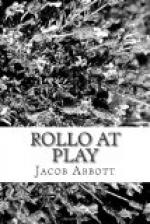“No, sir; but it would not be so bad as it would be if he should stay away when he knew that the time was out.”
“No, it would not be so wilful an act of disobedience, but it would be disobedience, notwithstanding. You see, Rollo,” he continued, “when I tell you or any boy to come back in half an hour, there are two things implied in the command—first, that you should notice the time, and, secondly, that you should come back when the time is out. Now, you may disobey the command by neglecting either of these.”
“Yes, sir,” said Rollo, “I see we may, but I did not think of it before.”
“No, I presume you did not,” said his father; “but I want you to understand it, and remember it after this forever. You have disobeyed, to-day, in two ways, in which boys are very apt to disobey, when they do not mean to do it wilfully. I will tell you what the principles are, again, so that you can remember and tell me when I ask you.
“1. Boys must take care to comply with their parents’ directions, if they are expressed in any way whatsoever; and,
“2. When directed to do any thing in a particular time or way, they must see to it themselves, that they notice and keep in mind the circumstances which they are required to attend to.”
Rollo said he would try to remember it, and as he seemed attentive and docile, his father did not talk with him any more about his fault at that time. Besides, they came now to some very rough places in the path, and Rollo’s father had to lift Lucy over them.
Lucy spilled some of her berries in one place, and Rollo was going to help her pick them up, but Jonas said they had better leave them for the birds, and walk on.
“So we will, Lucy,” said Rollo, “and I rather think that Mosette is hungry by this time.”
“Yes,” said Jonas, “and what are you going to do with Mosette?”
“O, put him in a cage, and bring him up tame,” said Rollo. “I mean to teach him to eat out of my hand. I shall treat him very kindly, though he is my little prisoner.”
“I would give: him the liberty of the yard, if I were you,” said some one behind, laughing.
Rollo looked round. It was his uncle George, walking close behind him.
“What is the liberty of the yard?” said Rollo.
“Why, when men intend to treat a prisoner kindly, they leave the prison door open, and let him walk about the yard; and this is called letting him have the liberty of the yard; and sometimes they let them go over half the town.”
“Do you think I had better do so with Mosette?” said Rollo.
“Yes,” said his uncle George; “leave his cage open, and let him go where he pleases.”
“O, he would fly entirely away,” said Rollo.
“Perhaps not, if you should feed him well, and treat him very kindly. He might like his cage better than any nest.”
“I shall treat him as kindly as I can,” said Rollo; “only think, Jonas, that Jim said, if he had found him, he should have set him up upon the fence for a mark to fire stones at!”




